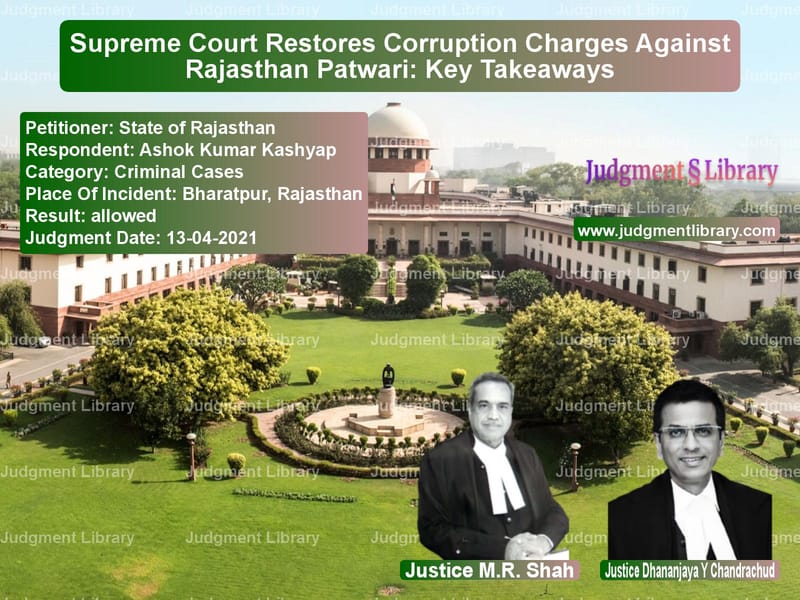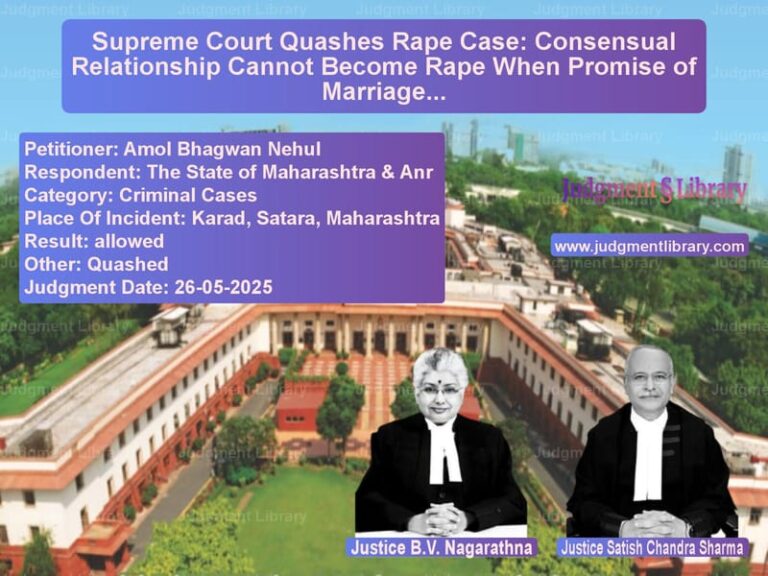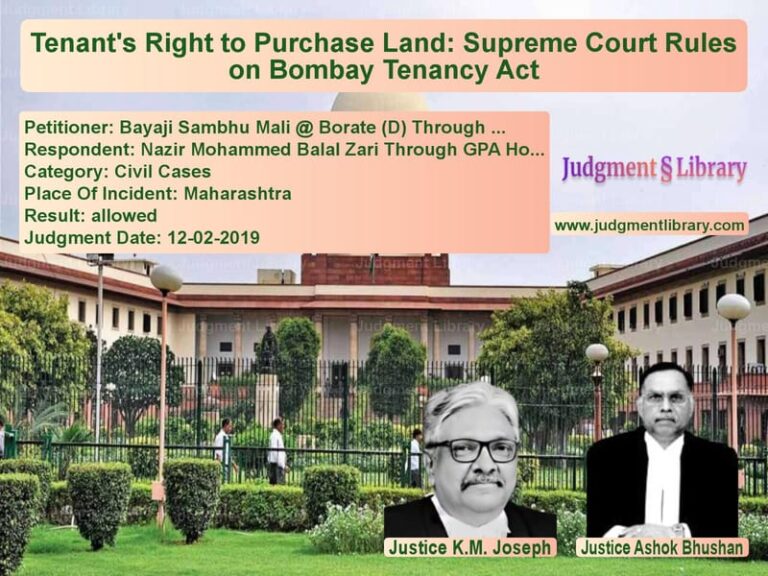Supreme Court Restores Corruption Charges Against Rajasthan Patwari: Key Takeaways
The Supreme Court of India recently ruled in the case of State of Rajasthan v. Ashok Kumar Kashyap, restoring corruption charges against a government official accused of demanding a bribe. The case highlights the legal framework governing corruption under the Prevention of Corruption Act, 1988 and the judicial approach to framing charges in such cases.
Background of the Case
The respondent, Ashok Kumar Kashyap, was serving as a Patwari (land revenue officer) in Bharatpur, Rajasthan. On August 31, 2010, a complaint was lodged with the Anti-Corruption Bureau (ACB) alleging that the accused had demanded a bribe of Rs. 2,800 for endorsing a report required for issuing a domicile and caste certificate.
Read also: https://judgmentlibrary.com/mukhtar-ansaris-custody-supreme-court-orders-transfer-to-uttar-pradesh/
Following the complaint, the ACB conducted an investigation and filed a charge sheet against the accused under Section 7 of the Prevention of Corruption Act. The Special Judge, Prevention of Corruption Act, Bharatpur, framed charges against the accused on June 22, 2018. However, upon a revision petition filed by the accused, the Rajasthan High Court quashed the charges, leading to an appeal by the State of Rajasthan before the Supreme Court.
Key Issues Raised
- Whether the High Court was justified in quashing the charges under Section 7 of the Prevention of Corruption Act?
- Whether a prima facie case existed against the accused?
- Whether the High Court exceeded its jurisdiction by evaluating evidence at the stage of framing charges?
Arguments by the Appellant (State of Rajasthan)
- “The High Court erred in evaluating the evidence at the charge-framing stage, which is impermissible in law.”
- “The transcript of the conversation between the accused and the complainant establishes a demand for bribe, satisfying the essential ingredients of Section 7 of the Prevention of Corruption Act.”
- “At the stage of framing charges, the court is required only to assess whether there is a prima facie case, not conduct a mini-trial.”
Arguments by the Respondent (Ashok Kumar Kashyap)
- “The transcript does not establish a clear demand for a bribe; rather, it pertains to a prior transaction related to bank dues.”
- “The complainant’s application was rejected on August 29, 2010, and no official work was pending before the accused at the time of the alleged bribe demand.”
- “The ACB did not conduct a trap operation, and the absence of recovery of bribe money weakens the case.”
Supreme Court’s Observations on Framing of Charges
The Supreme Court emphasized the settled legal position that:
- “At the stage of framing of charge, the court must only determine whether a prima facie case exists, not whether the accused is likely to be convicted.”
- “Detailed evaluation of evidence is impermissible at the charge-framing stage.”
- “Even an attempt to solicit a bribe is sufficient to attract liability under Section 7 of the Prevention of Corruption Act.”
Supreme Court’s Judgment
The Supreme Court ruled in favor of the State of Rajasthan, setting aside the High Court’s order and restoring the charges against the accused. The key directives of the judgment are:
- The High Court’s order quashing the charges is reversed.
- The order of the Special Judge framing charges under Section 7 of the Prevention of Corruption Act is restored.
- The trial court is directed to proceed with the case as per law.
Key Takeaways from the Judgment
- Judicial restraint at charge-framing stage: Courts should refrain from conducting a detailed analysis of evidence when framing charges.
- Prevention of Corruption Act is stringent: Even an attempt to solicit a bribe is sufficient to frame charges.
- Trap proceedings not mandatory: The absence of recovery of bribe money does not automatically weaken a case if demand is established.
- Higher courts must not interfere lightly: High Courts should exercise caution when interfering with lower court orders in corruption cases.
Conclusion
The Supreme Court’s ruling in State of Rajasthan v. Ashok Kumar Kashyap reaffirms the principle that corruption cases should be decided based on a prima facie assessment at the charge-framing stage. The judgment strengthens the implementation of the Prevention of Corruption Act and underscores the importance of judicial restraint in revisional jurisdiction. This case serves as a warning to public officials and reinforces the judiciary’s commitment to tackling corruption within government institutions.
Petitioner Name: State of Rajasthan.Respondent Name: Ashok Kumar Kashyap.Judgment By: Justice M.R. Shah, Justice Dhananjaya Y Chandrachud.Place Of Incident: Bharatpur, Rajasthan.Judgment Date: 13-04-2021.
Don’t miss out on the full details! Download the complete judgment in PDF format below and gain valuable insights instantly!
Download Judgment: state-of-rajasthan-vs-ashok-kumar-kashyap-supreme-court-of-india-judgment-dated-13-04-2021.pdf
Directly Download Judgment: Directly download this Judgment
See all petitions in Fraud and Forgery
See all petitions in Extortion and Blackmail
See all petitions in Judgment by Mukeshkumar Rasikbhai Shah
See all petitions in Judgment by Dhananjaya Y Chandrachud
See all petitions in allowed
See all petitions in supreme court of India judgments April 2021
See all petitions in 2021 judgments
See all posts in Criminal Cases Category
See all allowed petitions in Criminal Cases Category
See all Dismissed petitions in Criminal Cases Category
See all partially allowed petitions in Criminal Cases Category







